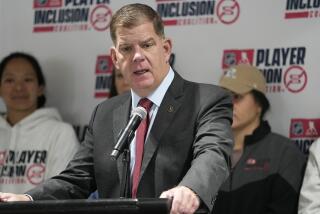Bettman Not Budging Now
- Share via
After subsisting on a starvation diet of rumors and wishful thinking for 127 days, hockey fans were seeing mirages of labor peace when the NHL and the players’ union met on Wednesday and Thursday.
Stories flew around the Internet that the two sides were polishing an eight-year deal that would start with a luxury tax on payrolls, which players favor, but would switch to a salary cap -- which owners advocate -- if the tax didn’t slow salary growth to certain levels.
Some “insiders” said the deal would be for six years. Others said they’d heard from a trusted source, such as a neighbor’s cousin’s husband’s father-in-law, that the Phoenix Coyotes and Mighty Ducks had ordered equipment for training camp, which had to mean that the season would start soon.
None of it was true. Nor will it come true any time soon.
Commissioner Gary Bettman did not march the NHL this close to the abyss to compromise now.
He did not allow his league to disappear -- almost unnoticed, sad to say -- and allow merchandising revenues to evaporate so he could cave in and agree to a luxury tax when he believes a tax won’t deter the kind of lavish spending that put the league in a $1-billion hole.
He did not jeopardize the future of a sport that has slipped perilously close to becoming a fringe activity to walk away with anything less than a salary cap -- or something with a different name but similar effect. He will get a salary cap out of this or there won’t be a season.
The sooner players realize it, the sooner there will be hockey.
Is it better to earn salaries that are pegged at 54% of league revenues, as in the offer the NHL made in December, or to earn 100% of nothing?
On Thursday, the second straight day of talks after more than a month of silence, Ted Saskin of the NHL Players’ Assn. said the gathering of league and union representatives in Toronto had produced “good dialogue.” Bill Daly, chief legal officer of the NHL, called it “two good days of communication.”
The niceties ended there.
They have “some serious differences of opinion,” Saskin acknowledged. Said Daly: “We continue to have some strong philosophical differences.”
Translation: Nothing has changed since Sept. 15, when the lockout began.
“What was the news today?” Mighty Duck Coach Mike Babcock said. “Was the news that being nice to each other wasn’t going to get the job done?”
Bettman isn’t paid to be nice. He’s being paid to wrest a salary cap from the carnage of this dispute.
Bettman is a businessman who works for a bunch of very rich businessmen -- the NHL’s 30 owners -- and they’ve determined that their business doesn’t work. Unlike fans, he doesn’t consider the season to be sacred. He’s willing to sacrifice playing this season, and the next, to get a cap and predictable player costs. If in the process the NHL shrinks and becomes a niche sport, he can live with that. It might not even be such a terrible thing.
Bettman will hold firm and hope the union breaks, remembering that he gave in too easily during the labor dispute of 1994-95.
Under pressure from frightened owners, he accepted a deal that became increasingly unfavorable to the league as agents and players learned how to exploit its loopholes. He extended the deal to secure players’ agreement to participate in the 1998 Olympics and again as part of a four-team expansion, but the Olympics weren’t the marketing bonanza he had anticipated.
Now, Bettman has no choice. That’s finally starting to dawn on the players’ union.
The NHL’s insistence on a cap is “clearly a central issue” in prolonging the dispute Saskin said, adding that the two sides would “continue to try to find ways to bridge the gap.”
It won’t be bridged with a luxury tax.
With every day the lockout goes on, with every page torn off the calendar, the NHL recedes into an ever more distant memory.
“I’m a big fan of hockey and I can’t understand why these two groups can’t work this out,” Babcock said. “There’s got to be a middle ground for players to make money, owners to make money and fans to enjoy the game.”
In Bettman’s mind, middle ground means capitulation by the union. And since he holds the keys to the Zamboni, the union will be left with nothing but ice chips unless it goes along for the ride.
More to Read
Go beyond the scoreboard
Get the latest on L.A.'s teams in the daily Sports Report newsletter.
You may occasionally receive promotional content from the Los Angeles Times.







